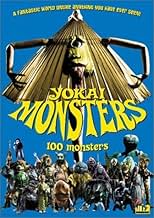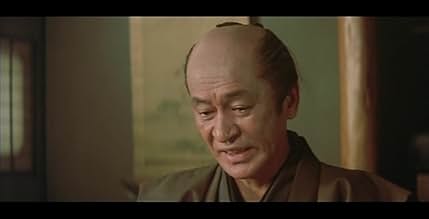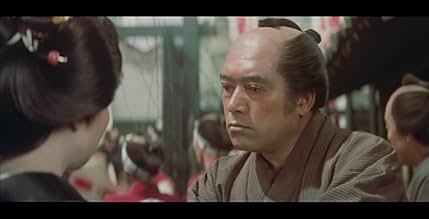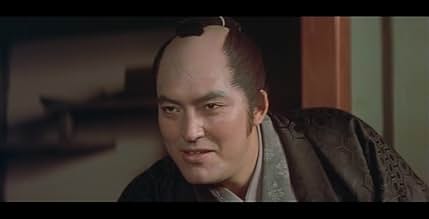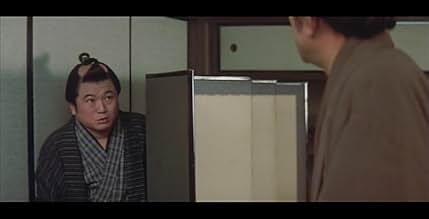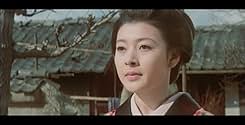AVALIAÇÃO DA IMDb
6,5/10
1,1 mil
SUA AVALIAÇÃO
Adicionar um enredo no seu idiomaThe local yôkai (Japanese spirits) interfere to avenge a murder and thwart the plans of corrupt officials.The local yôkai (Japanese spirits) interfere to avenge a murder and thwart the plans of corrupt officials.The local yôkai (Japanese spirits) interfere to avenge a murder and thwart the plans of corrupt officials.
Avaliações em destaque
This is one of the three great Japanese Yokai movies that ADV has released. All the monsters in it are based on Japanese folklore and traditional art. It isn't as silly as "Spook Warfare" (Yôkai daisensô), which was more of a kids comedy, but it is still a lot of fun and has some genuinely creepy moments. The plot is about a wicked developer who is brutally trying to drive people out of an apartment building and destroy a nearby shrine. Of course this makes the the Yokai monsters angry and they retaliate. Movies like this are almost as much about the monsters though as the plot. Yokai Monsters: 100 Monsters has some funny monsters and great costumes for a 60's Japanese monster flick. I recommend it.
The first in Daiei Film's Yokai Monsters trilogy, 100 Monsters is a bizarre mix of samurai movie and the supernatural, its weird and wonderful monsters (or yokai) based on traditional illustrations from Japanese folklore.
The film sees a ruthless lord and a corrupt magistrate resorting to underhand methods, including murder, to get their hands on some valuable real estate currently occupied by a shrine and tenement buildings, their plan being to tear down the existing structures and build a brothel. Ronin Yasutaro (Jun Fujimaki) stands up to the bad guys, but more unusual help comes in the form of the yokai, ghostly monsters who appear on the scene after the land-hungry villains fail to conduct a curse eliminating ritual after a story-telling ceremony.
Using old-school techniques to bring the fantastical creatures to life (men in manky costumes, some puppetry, and crude animation), the film is unlikely to wow modern viewers with its special effects, but there's an undeniable charm to the lo-fi approach and the sheer silliness of the monster designs is endearing (a long-necked woman, a one-legged umbrella and faceless people). Sadly, there just isn't enough of the yokai throughout the film, the bulk of the movie focusing on Yasutaro's run-ins with the bad guys - routine samurai drama that fails to excite.
5.5/10, rounded up to 6 for the giant slit-mouthed floating head - now that was genuinely creepy!
The film sees a ruthless lord and a corrupt magistrate resorting to underhand methods, including murder, to get their hands on some valuable real estate currently occupied by a shrine and tenement buildings, their plan being to tear down the existing structures and build a brothel. Ronin Yasutaro (Jun Fujimaki) stands up to the bad guys, but more unusual help comes in the form of the yokai, ghostly monsters who appear on the scene after the land-hungry villains fail to conduct a curse eliminating ritual after a story-telling ceremony.
Using old-school techniques to bring the fantastical creatures to life (men in manky costumes, some puppetry, and crude animation), the film is unlikely to wow modern viewers with its special effects, but there's an undeniable charm to the lo-fi approach and the sheer silliness of the monster designs is endearing (a long-necked woman, a one-legged umbrella and faceless people). Sadly, there just isn't enough of the yokai throughout the film, the bulk of the movie focusing on Yasutaro's run-ins with the bad guys - routine samurai drama that fails to excite.
5.5/10, rounded up to 6 for the giant slit-mouthed floating head - now that was genuinely creepy!
The story is fairly simple as corrupt, greedy, cruel officials meet with fates borne out by their own hubris. Inasmuch as there's more to it than that, the details really just come down to elucidation of the rottenness of the officials and their collaborators, and the nature of how they come to be removed as problems for the townspeople they victimize. It's worth observing that the most fantastical elements of the story are mostly reserved for the last fifth of the runtime, with only bits and pieces flavoring the proceedings before that. Still, the tale is compelling broadly, and where '100 monsters' does embrace the horror of scenario, those scenes are distinctly creepy in the way one would hope as death and madness take over. There is perhaps nothing so striking about this 1968 film as to demand viewership, and it's not the only Daiei production I've seen to struggle a little under a lumbering pace. When all is said and done, though, it's well worth watching on its own merits, and overall a solidly good time.
Setting aside the pacing, this is well made in every capacity. The sets and costume design are just as lovely as one would expect from most any period fare coming out of Japan, and the feature is very easy on the eyes, not least as the warm cinematography of Yasukazu Takemura brings out every detail with a soft yet crisp lens. The cast give admirable performances around commensurate with the material, and I find no fault in Kimiyoshi Yasuda's direction in orchestrating shots and scenes. Perhaps most importantly given the space in which 'Yokai monsters' plays, all the most intense elements of the production look outstanding as they come to bear, mostly within the last stretch. All the stunts and effects that are employed look really great, and the imagination poured into the design of the promised entities is matched only by the enthusiasm with which they were realized by the artists who created the costumes and props and the actors who played them. By and large the result is more "fun-scary" than "scary-scary," but it all comes off very well, and in its own manner provides the flavorful entertainment we anticipate.
Unless one is a major fan of Daiei, or the otherwise many monster flicks that Japan has produced over the years, there isn't necessarily a special reason to check this out. It's enjoyable, but not hugely striking, and it perhaps is not the most robustly invigorating or satisfying title one could watch. '100 monsters' is a classic that remains deserving on its own merits, however, and if one does have the opportunity to watch, this is a fine picture to check out for something comparatively light.
Setting aside the pacing, this is well made in every capacity. The sets and costume design are just as lovely as one would expect from most any period fare coming out of Japan, and the feature is very easy on the eyes, not least as the warm cinematography of Yasukazu Takemura brings out every detail with a soft yet crisp lens. The cast give admirable performances around commensurate with the material, and I find no fault in Kimiyoshi Yasuda's direction in orchestrating shots and scenes. Perhaps most importantly given the space in which 'Yokai monsters' plays, all the most intense elements of the production look outstanding as they come to bear, mostly within the last stretch. All the stunts and effects that are employed look really great, and the imagination poured into the design of the promised entities is matched only by the enthusiasm with which they were realized by the artists who created the costumes and props and the actors who played them. By and large the result is more "fun-scary" than "scary-scary," but it all comes off very well, and in its own manner provides the flavorful entertainment we anticipate.
Unless one is a major fan of Daiei, or the otherwise many monster flicks that Japan has produced over the years, there isn't necessarily a special reason to check this out. It's enjoyable, but not hugely striking, and it perhaps is not the most robustly invigorating or satisfying title one could watch. '100 monsters' is a classic that remains deserving on its own merits, however, and if one does have the opportunity to watch, this is a fine picture to check out for something comparatively light.
Unscrupulous magistrate Tajimaya (Takashi Kanda) uses theft, coercion, violence, and ultimately murder to take over a tenement house and a shrine with the intent of tearing them down. He also uses his leverage to force Ôkubi (Keiko Koyanagi), the beautiful daughter of the tenement's owner (Tatsuo Hanabu) to become his mistress. Tajimaya's actions and disrespect angers the local spirits, the Yôkai, and soon he and his minions find themselves cursed and harassed by monsters. The film, first in a Yokai trilogy from Daiei Film, is an imaginative fantasy with odd imagery (the 'umbrella monster' features prominently in the advertising) superimposed on a typical Japanese samurai adventure. The monsters (a mix of animation, puppets and costumes) are frequently quite bizarre. I am not familiar with Japanese folklore, but I gather that many of the diverse creatures represent traditional tropes (for example: the umbrella monster ('Kasa-obake') and the long-necked woman (Rokurokubi). 'Yokai: 100 Monsters' ('Yôkai hyaku monogatari') is entertaining and offbeat (at least from a 'Western perspective'), and likely a good introduction to yet another fanciful Japanese film genre. Note: I watched an English-subtitled version that, judging from some of the idioms, seems to have been made several years after the original film was released.
THE HUNDRED MONSTERS is a very bizarre little Japanese film and the first part of a 'YOKAI MONSTERS' trilogy. These films were remembered in the new millennium when none other than Takashi Miike directed his own version of the story (THE GREAT YOKAI WAR). Like other period monster flicks from Japan in the 1960s such as DAIMAJIN, THE HUNDRED MONSTERS feels very much like a traditional samurai movie with added monster action.
The story is a simple and familiar one about some ruthless property developers kicking a bunch of worthwhiles out of their homes. Even worse, they destroy a sacred shrine in the process. This storyline could be told in any country or era, but at least the characters are sufficiently interesting to keep viewers watching. And then we have the monsters, which are among the most bizarre ever filmed. I can't really describe them here, but there's stuff that'll have your jaw dropping, particularly the umbrella monster. A mix of practical and visual effects combine very well to create some fantastic scenes that certainly stick in the mind.
The story is a simple and familiar one about some ruthless property developers kicking a bunch of worthwhiles out of their homes. Even worse, they destroy a sacred shrine in the process. This storyline could be told in any country or era, but at least the characters are sufficiently interesting to keep viewers watching. And then we have the monsters, which are among the most bizarre ever filmed. I can't really describe them here, but there's stuff that'll have your jaw dropping, particularly the umbrella monster. A mix of practical and visual effects combine very well to create some fantastic scenes that certainly stick in the mind.
Você sabia?
- CuriosidadesThe "monsters" in this film are based on traditional Japanese spirits.
Principais escolhas
Faça login para avaliar e ver a lista de recomendações personalizadas
- How long is Yokai Monsters: 100 Monsters?Fornecido pela Alexa
Detalhes
- Data de lançamento
- País de origem
- Idioma
- Também conhecido como
- Yokai Monsters: 100 Monsters
- Empresa de produção
- Consulte mais créditos da empresa na IMDbPro
- Tempo de duração
- 1 h 19 min(79 min)
- Proporção
- 2.35 : 1
Contribua para esta página
Sugerir uma alteração ou adicionar conteúdo ausente


![Trailer [OV]](https://m.media-amazon.com/images/M/MV5BNmQwOTdkZDItNjZkZi00MmQwLWFjYjMtYjJlZDJiYTA4NGY4XkEyXkFqcGdeQXRyYW5zY29kZS13b3JrZmxvdw@@._V1_QL75_UX500_CR0)
